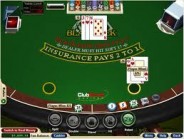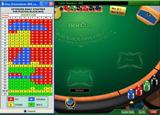Revisiting the Blackjack Basic Strategy Chart
If you're a blackjack player, and have never looked at a basic strategy table, you should.
It's a tidy little grid, with possible player hands down the side, and possible dealer face-up cards John Grochowski is the author of six gaming books including the "Answer Book" series -- The Casino Answer Book, The Video Poker Answer Book, The Craps Answer Book and a revised edition of The Slot Machine Answer Book. His articles cover blackjack, slots and video poker strategy as well as casino etiquette and getting the most bang for your buck in Vegas. John's website is www.casinoanswerman.com across the top. Find the rectangle directly across from your hand, and directly down from the dealer's, and the basic strategy table tells you whether to hit, stand, split, double down or even surrender, if the house permits such a thing.
John Grochowski is the author of six gaming books including the "Answer Book" series -- The Casino Answer Book, The Video Poker Answer Book, The Craps Answer Book and a revised edition of The Slot Machine Answer Book. His articles cover blackjack, slots and video poker strategy as well as casino etiquette and getting the most bang for your buck in Vegas. John's website is www.casinoanswerman.com across the top. Find the rectangle directly across from your hand, and directly down from the dealer's, and the basic strategy table tells you whether to hit, stand, split, double down or even surrender, if the house permits such a thing.
Mostly the plays fit into neat little groupings, as you can see if you check out blackjack charts such as those here at ReadyBetGo. Large blocks of hands have the same correct play. If you start with a pair of 7s, the block of rectangles showing dealer up cards of 2 through 7 tell you to split the pair, while the block showing dealer's 8 or above tell you just to hit. Sometimes the block of like plays comes in the middle of the line. With Ace-4 or Ace-5, the grid tells you to double down in that block showing dealer's 4, 5 or 6, but just to hit against anything else.
Basic strategy is orderly and logical. The charts don't tell you to make one play against one dealer up card, the opposite play against the next higher card, then go back to the original play against the next cart.
Except ...
Yes, there is an exception to all that orderliness. When you have a pair of 9s, the blocks aren't quite so neat. Sure, there's a big block that tells you to split the pair. Whenever you have a 2 through 6, the chart tells you to split. But when you have a 7, it tells you to stand. Then it says to go back to splitting if the dealer has an 8 or 9, and back to standing against a dealer's 10-value or Ace.
Those back-and-forth-and-back shifts are unique on the basic strategy table, and worth thinking about.
The hands to focus on are those three rectangles that tell us just to stand on or pair of 9s. We stand when the dealer has a 7, and we stand when the dealer has a 10-value or an Ace. What the basic strategy chart is telling us is that in blackjack, sometimes we play offense, and sometimes we play defense. Sometimes our object is to maximize winnings, and sometimes our object is to minimize losses.
If you start with a pair of 9s and the dealer has a 7, you have an edge. Your 18 will win whenever the dealer has a 10-value --- 10, Jack, King or Queen --- face down, and it will push whenever the dealer has an Ace face down. Four of the 13 denominations in the deck turn your 18 into an instant winner, and there are no cards that turn the dealer's 7 into an instant winner against you. If the dealer is going to win the hand, he or she is going to have to draw. Standing pat is your best offense in that situation. You have the edge, so keep it.
But if the dealer has a 10-value or an Ace, you have no such edge. Your 18 will lose more often than it wins. Splitting the pair and starting each hand with a 9 doesn't help. It just leaves you with two hands that lose more often than they win. And splitting the pair means making a second wager, so you have more at risk.
Time to play defense. We stand on the 9s when the dealer shows a 10-value or Ace because we don't want to make a second bet and increase our risk.
So we play that little game of back-and-forth-and-back on the basic strategy chart. Dealt a pair of 9s, we play offense and maximize our potential winnings by standing when the dealer shows a 7, and we play defense, minimizing losses, when the dealer has a 10-value or Ace.
All very neat, don't you think?
Using the basic strategy chart correctly can significantly improve your chances of winning at blackjack. The more statistically perfect you play, the lower the house edge should be long-term.
Do keep in mind that there are more ways to reduce the house edge. Blackjack bonuses are another way to do this, by acting as a safety net the times when you end up losing your original deposit.
The only frustrating thing is that many casinos do not offer Blackjack bonuses and restrict the game when you play with bonus funds.
Our recommendation is to use trusted comparison sites like Bojoko or MrGamble to find out which casinos let you play blackjack with your bonus. Using the quick-filters from Bojoko will be particularly helpful, as they help you find blackjack bonuses with more fair terms and conditions, and with the percentages or bonus amounts you are looking for.
** ** **
Speaking of blackjack basic strategy, a caller recently asked why basic strategy charts say you should double down on 11 against all dealer face up cards in single-deck games, but not against Aces in multiple-deck games.
The reason is that in single-deck blackjack, each card dealt out has a greater effect on the composition of the remaining deck. If you have a 6 and a 5 for a two-card 11, and the dealer has an Ace, then 16 of the other 49 cards in a single deck --- 32.7 percent --- are 10-values that will give you 21. In a common six-deck game, it'd be 96 of 309 cards, or 31.1 percent.
You have a better chance of winding up with a strong hand when you double down in a single-deck game. That's why you double on 11 against an Ace when one deck is being used, but not in multiple-deck games.

